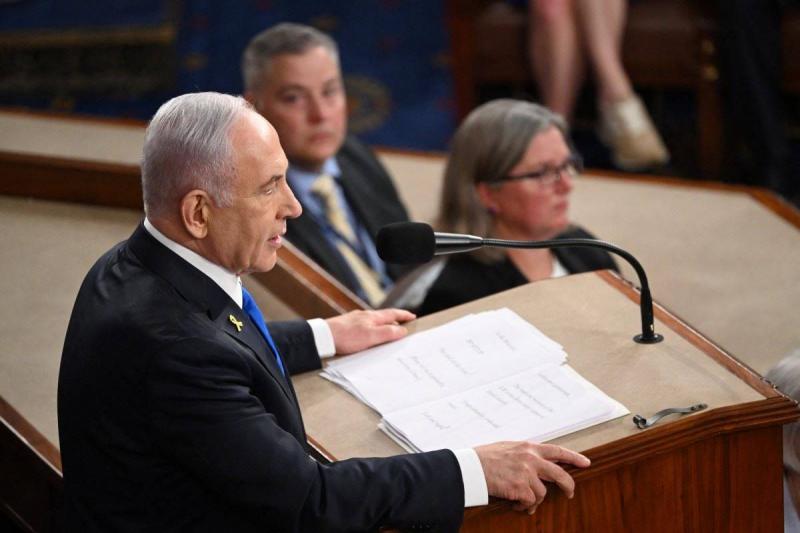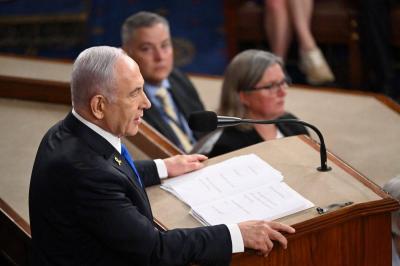Reactions within Israel varied following Prime Minister Benjamin Netanyahu's speech to Congress, where he addressed the Gaza war as the main focus of his approximately 55-minute address. While some Israeli media reports and social media activists praised Netanyahu's speech, viewing it as adding momentum to their country's stance on the ongoing war, it represented "disappointment" for the families of hostages who were hoping the Prime Minister would mention progress regarding their loved ones' release.
The *New York Times* noted that Netanyahu "did not mention a ceasefire or discuss the status of the deal being negotiated between Israel and Hamas for weeks, which the Biden administration is eager to implement," but merely stated that "the war could end if Hamas surrendered, disarmed, and returned the hostages."
Conversely, the *Axios* website suggested that Netanyahu tried to use the speech to reaffirm his leadership in Israel, where polls indicate that over 70% want him to resign, pointing out that Netanyahu's address came at a "critical moment" in negotiations over the Gaza hostage agreement and a ceasefire, yet the Israeli Prime Minister scarcely mentioned this issue.
Shortly before the speech, Netanyahu's office acknowledged that the Prime Minister had canceled a planned visit for Israeli negotiators to Qatar on Thursday, explaining that Netanyahu wanted to meet with U.S. President Biden before the delegation went to Doha.
In his analysis, Israeli political analyst Shlomo Ganor indicated that Netanyahu's bringing a group of hostage families, a freed hostage, and several fighters to the congressional hall, and elaborating on their roles during the war, helped convey the message about "the brutality of Hamas and the necessity of continuing the war until the organization is destroyed."
However, Ganor clarified that Netanyahu refrained from revealing details about his stance on the hostage deal and the ceasefire, which angered the families of the abducted, who hope that the Prime Minister's position might change in his upcoming meeting with Biden.
Netanyahu is set to meet with Biden and Harris on Thursday, and they are expected to pressure him to make progress towards a ceasefire and an agreement for the release of hostages from Hamas, following weeks of reports on widening gaps between them.
Regarding the implications of Netanyahu's speech, Ganor believes that "the Israeli Prime Minister largely restored his lost international standing due to the war, strengthened U.S.-Israel ties despite differences with President Biden, identified Iran as a common enemy for both countries, and implicitly supported Trump's campaign by outlining part of his vision for the future of Gaza."
Ganor emphasized that Netanyahu demonstrated to his supporters in Likud that he remains a figure of "first-class caliber," and despite international pressures and internal challenges, he insists on confronting these challenges.
Israeli political analyst Eli Nissan noted that Israelis were "astonished that Netanyahu delivered such a speech to the American people," but there were nonetheless criticisms from the families of hostages and opposition leader Yair Lapid, who complained about the Prime Minister’s failure to thoroughly address the issue of bringing back the 120 hostages, whether alive or deceased. Lapid described the Prime Minister’s address before Congress as a "stain of shame," stating on his X platform: “What a shame! An hour-long speech without saying the most important sentence: there will be a deal to bring back the abductees.”
Nissan remarked in a conversation with *Sky* that "this was the main point that received significant criticism of Netanyahu's speech." Netanyahu had stated that he was confident efforts to secure the release of hostages held in Gaza would succeed, adding: "We are actively participating in intensive efforts to secure their release. I am confident these efforts will succeed."
Nissan indicated that "Netanyahu has indeed gained new momentum after delivering the speech, attracting considerable popular following even from his critics, aside from showing himself as a strong man in front of the American people as well." He noted that Netanyahu attempted in his speech to address both the Republican and Democratic parties and to find common ground between them, aiming to encourage the U.S. administration to provide the necessary support for Israel to continue its war against Hamas.




